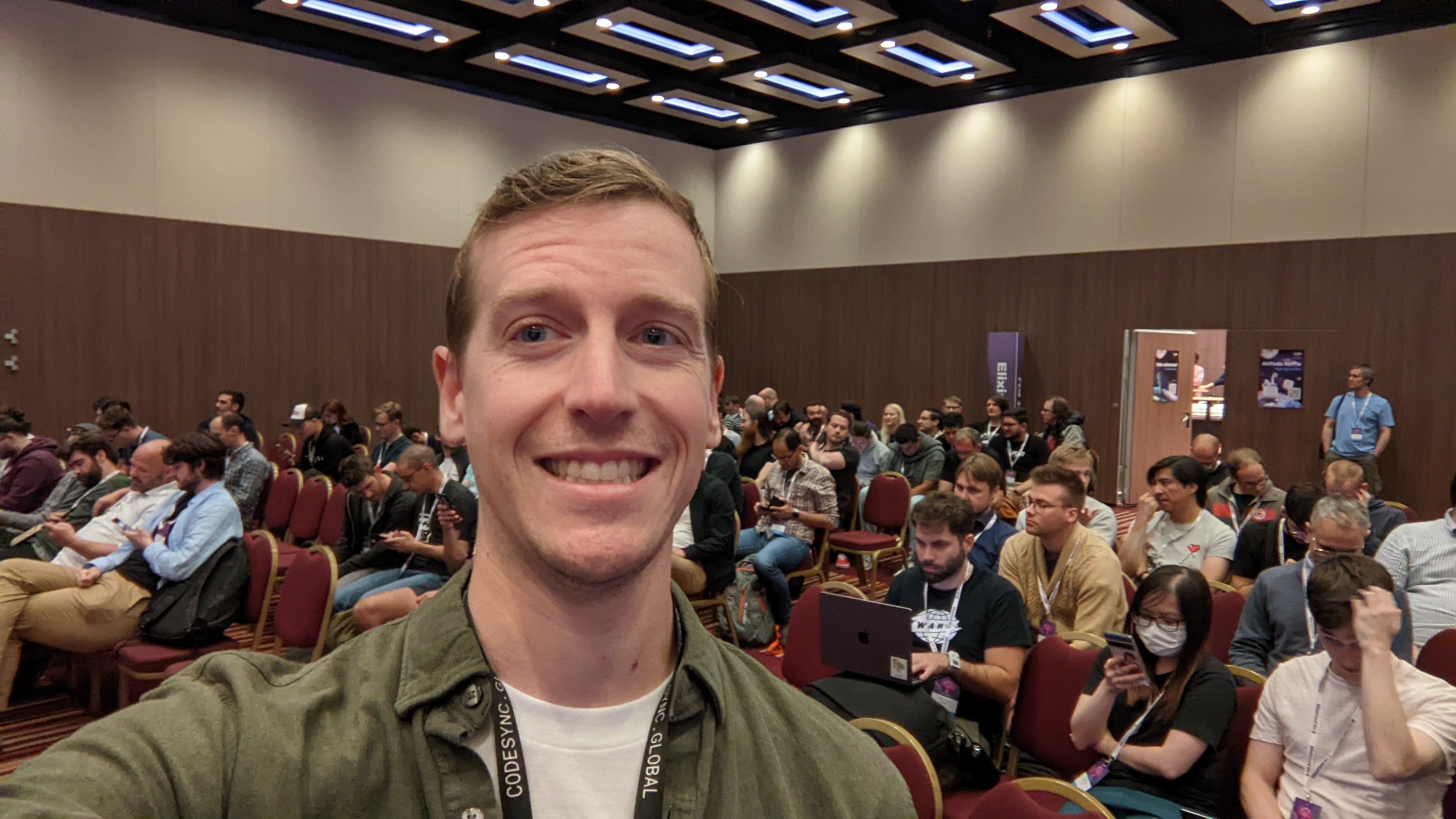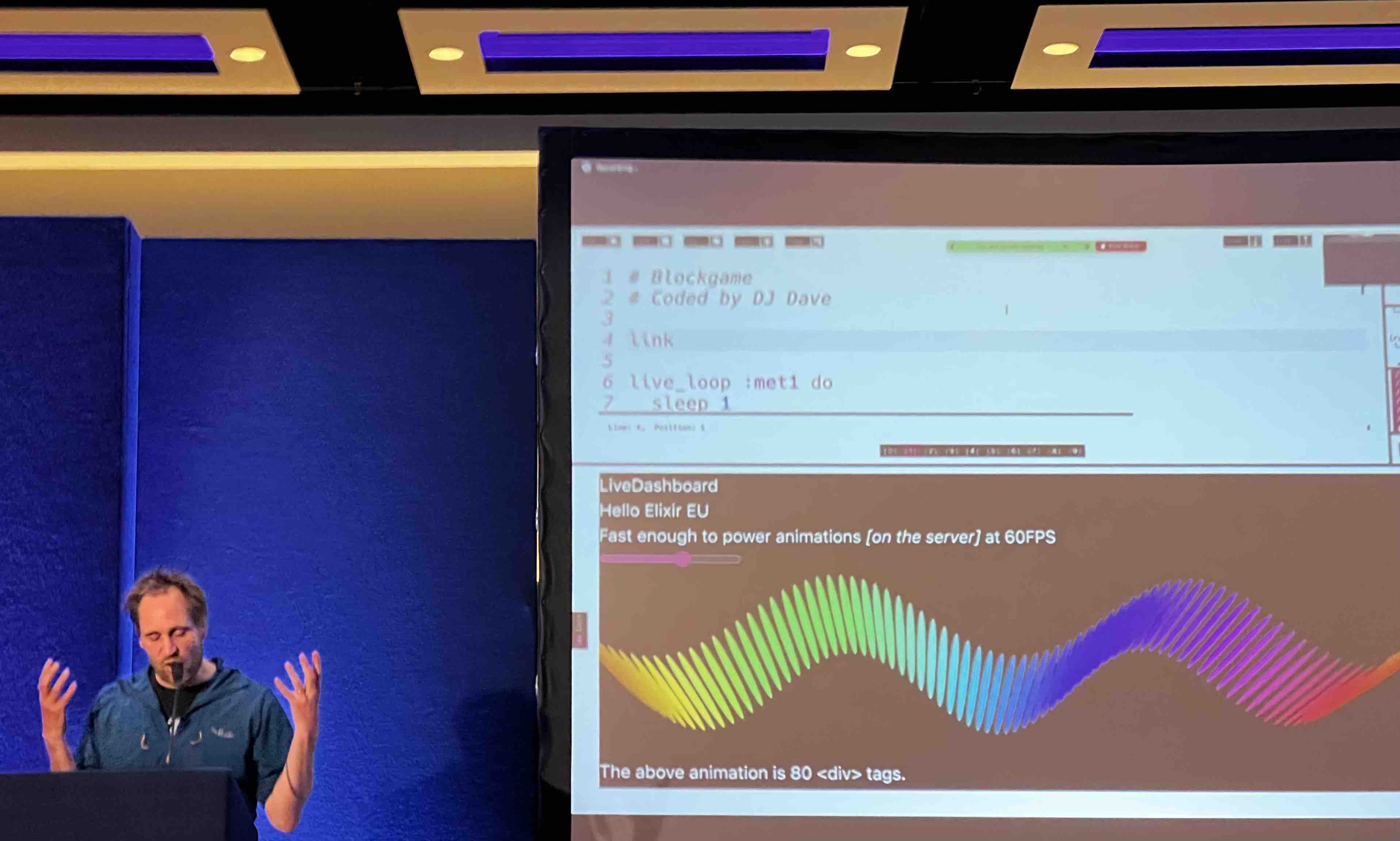
ElixirConf.EU 2022
This year’s ElixirConf marks Elixir’s 10th birthday, in the rest of this post I’m sharing my experience of what took place this time.
Started from the bottom now we’re here!
— ElixirConf Europe (@ElixirConfEU) June 9, 2022
It has already been 10 years since the first #Elixir commit.
Let’s look back at the Elixir timeline with @Josevalim pic.twitter.com/UWjuPKlnVF
Location
I happen to live in London so this was my first ElixirConf on European (geographically speaking) soil where I didn’t have to pack my bags. I’d never been in West Brompton though and I had the chance to experience some of the local pubs. It was surprisingly sunny during both days of the conf but we didn’t get to enjoy that.
Conference - Day 1
Keynote - Celebrating the 10 Years of Elixir - José Valim
In this talk, José talked about the future of the language. He started with an intend to address “the elephant in the room” which he said is adding types to the language. We were asked to vote by raising hands whether we’d welcome types, reject them or “trust the core team”. The majority would welcome them. He went into detail about certain areas like performance, documentation / developer experience, code maintanance, specification, design tooling and proofs where types can potentially bring improvements to the language.
A PhD scholarship was also announced to research and develop set-theoretic types for Elixir (announcement). This publication by Giuseppe Castagna supervising this project is an interesting read.
Besides types, other future areas of focus are the developer and learning experience, where Dashbit has hired Lukasz Samson to work on IDEs and machine learning where he shared live_onnx as an example of how easy it to build an Axon-powered application which runs on the GPU with a LiveView UI.
Building a Block-Based Editor in Phoenix LiveView - Nikola Begedin
Nikola walked us through the challenges he faced developing a block-based WYSIWYG editor using LiveView.
Thankfully it’s open-source so you can take a gander here. The highlight of this talk is how a comprehensive test suite powered by Cypress helped him iron out the kinks of contenteditable and other browser quirks.
Get Your CRUD Together - Andrew Ek
This was Andrew’s take on making CRUD with Phoenix a bit more.. omakase by creating a dedicated Repo abstraction. With this meta-programming contraption, contexts behave a bit more like ActiveRecord models where you get a whole bunch of ready-to-use functions for data retrieval, validation and the rest.
The general notions where:
- Separate book-keeping from business logic
- Prefer consistent representations (within a context) where possible
- Structs, aggregates and the “Repo” pattern help build consistency
- Don’t be afraid to normalize your database
- Be mindful of performance versus speed of delivery
This talk was through Zoom. I have to admit it’s a first for me, working from home the last few years, going to a conference venue only to “join” a remote call, watching it on the big screen. We live in the age of remote work, we should embrace it even if it feels a tad bizarre.
Observable Elixir - Bernardo Amorim
One of my favourite talks this year. Oh boy does he speak fast, how fast though? if only there was telemetry for that 😅
He started the talk with essential terms about observability relevant to telemetry.
Observability is a measure of how well internal states of a system can be inferred from knowledge of its external outputs.
Go ahead, set up OpenTelemetry for your app today!
Start with:
def deps do
[
{:opentelemetry, "~> 1.0"},
{:opentelemetry_exporter, "~> 1.0"},
{:opentelemetry_phoenix, "~> 1.0"},
{:opentelemetry_ecto, "~> 1.0"},
{:opentelemetry_tesla, "~> 2.0"}
]
end
Thankfully the slides of the talk are available here as well as the demo app here so you can use them as a guide to complete the setup.
Why Is My LiveView Slow and What can I Do About It? - De Wet Blomerus
This talk is surfacing the differences when it comes to debugging of “traditional” SPA applications compared to LiveView. With LiveView, one has to closely monitor the data exchange through a WebSocket. There was a live demo which wasn’t working on Safari and we found out that fly.io sets by default a concurrency limit of 25 simultaneous connections, dropping connections past that. Such surprises made the debugging aspect of the talk more realistic!
The code for the application shown as part of this talk can be found here and the live demo is still available speedy.fly.dev.
A Blueprint for Intuitive Internal Elixir Ecosystems - Ryan Young
A very insightful talk with actionable suggestions that can overall improve team communication and aid Elixir adoption.
Key takewaways:
Set up a software catalog
With a service catalog like Spotify’s Backstage discovering libraries and services can be much easier. It also provides quick shortcuts to bootstrap new projects.
Set up a package registry
Ryan said setting up urepo for for Hex package hosting was a key catalyst and in a short period of time more and more engineers published their packages. It’s also serves as a convenient way to host Hex Docs.
There was a question from the audience about the advantages of a private package registry compared to let’s say pointing to a git SHA or tag. With the registry, mix can tell us whether a newer version is available.
Streamline publishing documentation
urepo also serves as a convenient way to host Hex Docs. Making it straightforward for engineers to read the documentation of a package gives a significant velocity boost to teams and minimises integration errors.
Watch a clip of what Ryan has built here.
And here’s a photo Ryan shared (yay, I’m in the audience).

Related resources
- https://dashbit.co/blog/mix-hex-registry-build
- https://hex.pm/docs/self_hosting
- https://github.com/kobil-systems/repo
Keynote: Sonic Pi - Past, Present & Future - Sam Aaron
Incredible, awe-inspiring talk. What a legend. Without showing a single line of Elixir or a slide he showed what makes an Alchemist, to have a hacker spirit and bring positive change. Sonic Pi started out as an educational tool to teach programming to kids through music production. It has evolved to a whole ecosystem where professional DJs and amateurs experiment with ways to express themselves through music. It doesn’t require any music training or solid computer science fundamentals. It’s easy to install on Windows, MacOs or Linux and it’s so much fun!
Try it out today: sonic-pi and please consider supporting Sam on patreon so he can keep developing this excellent piece of software.
He also spoke about the technical challenges of running multiple blocks concurrently synchronising them and even linking a Sonic Pi instance to external programs like Ableton or other Sonic Pi instances on the internet. Really cool stuff.
The cherry on the cake is the possibility to embed LiveView apps in Sonic Pi (experiment) to be used as controls, visualisations etc.

The Party
Great first day of @ElixirConfEU. Fantastic closing keynote from @samaaron, followed by live music/coding session!
— José Valim (@josevalim) June 9, 2022
Thanks to the organizers for a great 10 years of Elixir party! pic.twitter.com/SrO4Z3DNVx
Sam Aaron on the decks. Yes, you can book him for your party!
Conference - Day 2
Automating the Automator - Tonći Galić
The slides of the talk are available online here.
He told us how once, he managed to automate his job to an extend where he was let go.
In his talk, he scoped automations to “codemods”, tools which work by converting the source code to AST form, modifying it and saving updated source code file.
Some recent changes in Elixir 1.13 make this process much easier:
His very promising plan is to create a Credo plugin using sourceror to provide
functionality similar to Rubocop’s --auto-correct .
Related Links
The Hydra from Hades in one of the slides was a nice touch.
Exploring Elixir Project Re-compilation - Anton Satin
Notes (copied from the final slide):
- It’s easier to prevent cascade recompilation than to fix it. Elixir and Phoenix help with that.
- There could be low hanging fruits in your app:
- Compile dependencies are the main culprit
- Cycles are worth checking
- Looking at dependencies gives us new perspective
Distributing Work With Queues and GCP PubSub - Johanna Larsson
Working with Airline XML APIs that are allegedly impossible to cache seems very challenging.
They picked GCP PubSub because it ticked the following boxes:
- Topics
- Subscriptions
- Filtered subscriptions
- Auto clean up
- Pull based API (Long polling)
- Push based API
- Managed
- Message acknowledgement deadlines
She also mentioned an issue they faced with Broadway and long-lived worker processes where memory wasn’t being garbage collected. I think they solved it by hibernating the processes.
Micro-Services and Events: Friends of Foes? - Roland Tritsch
Their architecture diagram:

Lessons Learned:
- Exactly-once is hard
- At-least once is much easier
- At-most once is even easier, but … no eventual consistency
- At-least once it is (just make sure your services can deal with duplicated events)
- Daily replays to the rescue
- Constantly proof the availability/consistency of the event-store
- Makes the system self-healing
- One more (un-expected operations) benefit: Outage analysis and outage repair!
TypeCheck - Effortless Runtime Type-Checking Marten (W-M) Wijnja / Qqwy
He spoke about TypeCheck a library for runtime type-checks.
He highlighted some of the common similar tools like Dialyzer and Gradualizer.
Pros:
- Checks (using the typespecs) for common mistakes
- Runs statically
Cons:
- Misses common mistakes (false negatives)
- Complains about some OK code (false positives)
- Slow to run, difficult to understand errors
- Opt-in
Gradualizer: Promising, but experimental
His future plans for this library are:
- Stable release (nearly there)
- Companion libraries
- type overrides for common libs (Phoenix, Ecto, Jason, Decimal, Absinthe, etc)
- Improve efficiency
- Support PropEr as well (as StreamData)
Outro
I wish there was a talk by Chris McCord, I’d love to hear what’s cooking for Phoenix.
Missed your chance to attend? Well, there’s the US one.
Spotted a Mistake?
Please contact me on twitter, or in the comments, or submit a PR for corrections.
